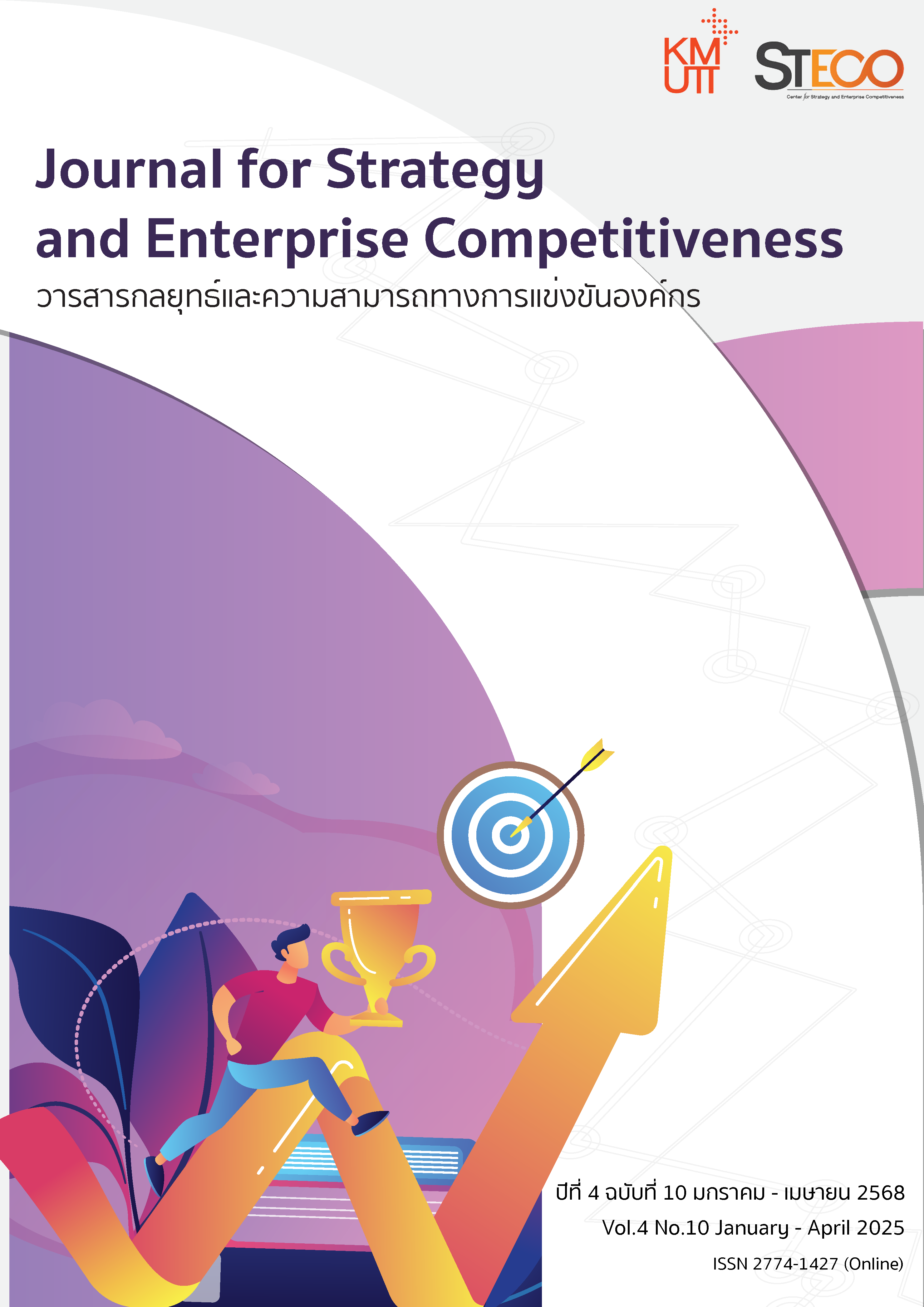Strategic Initiatives for Enhancing Compensation Management at Guangxi B Company
Keywords:
compensation management, compensation strategic initiative, human resource managementAbstract
The research objectives were: 1) to examine the current state of compensation management at Guangxi B Company, 2) to identify the gaps and defects in the compensation management practices at Guangxi B Company, and 3) to propose strategies for enhancing the compensation management at Guangxi B Company. This research employed convergent parallel mixed methods approach. Quantitative data were collected through a questionnaire distributed to all 367 employees, with 350 valid responses. Qualitative data were gathered through interviews with employees, middle managers, and senior management, totaling 13 participants, selected using purposive sampling. The quantitative data were analyzed by using descriptive statistics, while the qualitative data were analyzed through thematic analysis. The results from both methods were synthesized to provide a comprehensive understanding of the compensation system and effectively address the research objectives.
The research findings revealed that: 1) the compensation management system at Guangxi B Company showed moderate transparency and clarity, with average competitiveness in salary structures. Employee satisfaction was moderate, with concerns about fairness and alignment with market standards, particularly regarding bonus schemes and performance evaluations; 2) significant gaps included perceived pay disparities, low overall satisfaction with compensation packages, and a lack of transparency in compensation policies. Employees felt under-compensated relative to their responsibilities, and the unclear connection between performance and rewards led to feelings of inequity and demotivation; 3) enhancing compensation management involved establishing clear salary structures, simplifying bonus schemes, and implementing objective performance evaluations. Regular communication, market benchmarking, and creating feedback mechanisms were also essential for fostering transparency, fairness, and employee engagement, ultimately aligning compensation practices with employee expectations and industry standards.
References
Alliu, F. O., & Akinlabi, B. H. (2023). Employee compensation management and organizational performance of selected deposit money banks in Lagos State, Nigeria. European Journal of Research and Reflection in Management Sciences, 8(2), 22-32. https://doi.org/10.47772/IJRISS
Bai, M. (2019). Research on optimization of recruitment system of Company B. Management Observation, 33, 161-162.
Bryant, P. C., Brown, D., Cotton, C., Hill, B., Gibbs, M., & Sturman, M. C. (2020). Five experts respond to five questions about five trends in compensation and benefits over the next 5 years. Compensation & Benefits Review, 52(4), 138-155. https://doi.org/10.1177/088636872094202
Danish, R. Q., & Usman, A. (2010). Impact of reward and recognition on job satisfaction and motivation: An empirical study from Pakistan. International Journal of Business and Management, 5(2), 159-167.
Fulmer, I. S., & Li, J. (2022). Compensation, benefits, and total rewards: A bird's-eye (re) view. Annual Review of Organizational Psychology and Organizational Behavior, 9(1), 147-169. https://doi.org/10.1146/annurev-orgpsych-012420-055903
Gerhart, B., & Fang, M. (2014). Pay for (individual) performance: Issues, claims, evidence and the role of sorting effects. Human Resource Management Review, 24(1), 41-52. https://doi.org/10.1016/j.hrmr.2013.08.010
Hofmann, Y. E., & Strobel, M. (2020). Transparency goes a long way: Information transparency and its effect on job satisfaction and turnover intentions of the professoriate. Journal of Business Economics, 90, 713-732. https://doi.org/10.1007/s11573-020-00984-0
Ismail, A., & Abd Razak, M. R. (2023). Compensation management as a determinant of job satisfaction. IPN Journal of Research and Practice in Public Sector Accounting and Management, 7(1), 53-68. https://doi.org/10.58458/ipnj.v07.01.05.0049
Javed, A. (2024). The impact of leadership styles on employee performance in contemporary organizations. Journal of Management Studies, 40(1), 45-60.
Luna-Arocas, R., Danvila-Del Valle, I., & Lara, F. J. (2020). Talent management and organizational commitment: The partial mediating role of pay satisfaction. Employee Relations: The International Journal, 42(4), 863-881. https://doi.org/10.1108/ER-11-2019-0429
Peng, J., Yang, X., Guan, X., Zhou, L., & Huan, T. C. (2022). Will catering employees’ job dissatisfaction lead to brand sabotage behavior? A study based on conservation of resources and complexity theories. International Journal of Contemporary Hospitality Management, 34(5), 1882-1905. https://doi.org/10.1108/IJCHM-09-2021-1109
Okpebholo, E., & Sheikh, A. Z. (2020). Optimization of non-monetary reward provisions: Evidence from the UK banking sector. Business Review, 15(1), 1-18. https://doi.org/10.54784/1990-6587.1000
Quader, M. (2024). Exploring human resource management practices and employee satisfaction in Bangladesh's private banking sector. Journal of Policy Options, 7(1), 36-45.
Rasheed, M. I., Jamad, W. N., Pitafi, A. H., & Iqbal, S. M. J. (2020). Perceived compensation fairness, job design, and employee motivation: The mediating role of working environment. South Asian Journal of Management, 14(2), 229-246. https://doi.org/10.21621/sajms.2020142.05
Sharma, Y., Garg, M., & Bansal, A. (2020). Impact of compensation management on employees’ performance. International Journal of Management IT and Engineering, 10(5), 200-209.
Sürücü, L., & Maslakci, A. (2020). Validity and reliability in quantitative research. Business & Management Studies: An International Journal, 8(3), 2694-2726. https://doi.org/10.15295/bmij.v8i3.1540
Tumi, N. S., Hasan, A. N., & Khalid, J. (2022). Impact of compensation, job enrichment and enlargement, and training on employee motivation. Business Perspectives and Research, 10(1), 121-139. https://doi.org/10.1177/2278533721995353
Zafar, M. (2021). Impact of compensation practices on employee job performance: An empirical study. Management Science and Engineering Management, 2, 315-324.

Downloads
Published
How to Cite
Issue
Section
License
Copyright (c) 2025 Journal for Strategy and Enterprise Competitiveness

This work is licensed under a Creative Commons Attribution-NonCommercial-NoDerivatives 4.0 International License.
The opinions appearing in the content of articles of Journal for strategy and enterprise competitiveness. It is the opinion and responsibility of the article author. It is not the opinion and responsibility of the Center for strategy and enterprise competitiveness, King Mongkut's University of Technology Thonburi
Articles, information, content and images, etc., in the Journal for strategy and enterprise competitiveness. It is the exclusive copyright of the Center for strategy and enterprise competitiveness, King Mongkut's University of Technology Thonburi. If an individual or entity wants to distribute all or part of the content or for any action must obtain written permission from the Center for Strategy and enterprise Competitiveness, King Mongkut's University of Technology Thonburi.


